
Australia’s network of public EV charging stations is expanding rapidly.
Driven by strong investment from state governments, the federal government’s Australian Renewable Energy Agency (ARENA), and private companies, electric vehicle charging infrastructure has grown significantly in recent years. According to Carloop's quarterly report on Australia's fast charging network, as of mid-2025, there are more than 1,310 public fast-charging sites offering over 3,436 charging plugs nationwide, representing an 8.5% quarterly growth rate.
This rapid rollout is keeping pace with electric vehicle adoption, which has increased by over 80% since early 2024. Australia’s national EV fleet now exceeds 300,000 vehicles.
Chargefox, operated by Australian Motoring Services (which includes NRMA, RACV, RACQ, RAC, RAA and RACT), remains the country’s largest EV charging network with 950 sites across Australia.
Most public chargers are operated by dedicated EV charging providers that manage payments, power connections, maintenance and network expansion, often partnering with manufacturers such as Tritium, ABB, and Kempower.
So, which EV charging networks in Australia lead the way in 2025? How do they compare on price, speed, and coverage, and what’s next as the shift to zero-emission driving continues to accelerate?
EDITOR’S NOTE: Information in this story are correct at the time of publication and subject to change. For the most up-to-date locations and pricing, check the charging provider's mobile app.
Quick Facts
- 1,310+ public fast-charging sites nationwide
- 3,436+ individual charging plugs
- 8.5% quarterly growth rate
- Major operators: Chargefox/Australian Motoring Services (423 sites), Exploren (403 locations), Evie Networks (325 sites), Tesla (126 sites), Jolt (98 sites), Ampol (72 sites), BP Pulse (70 sites)
Chargefox Network (includes Australian Motoring Services)
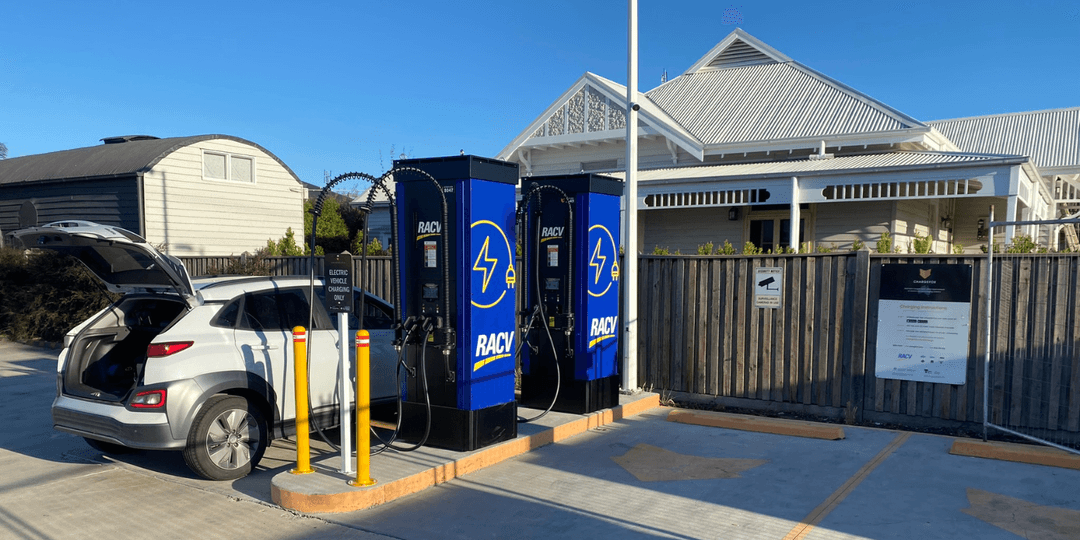
📍 No. of locations: ~950 sites | 2000 stations (500 DC and 1500 AC) (as of mid-2025)
⏲ Charging speeds: 4kW AC to 350kW DC
💵 Cost: Free to $0.99/kWh
📱Start charging: iOS | Android | RFID card compatible
Chargefox offers more charging locations than any other app, currently featuring chargers across 945 different locations across Australia. Typically, there's one to four stalls at each charging location.
Chargefox does not own any chargers but instead provides a single app providing access to chargers owned by hundreds of different organisations including large retailers such as Woolworths, motoring clubs networks such as the RAA, as well as many local councils and other organisations.
Chargefox offers charging options in all states and territories, ranging in speed from 7kW AC to 350kW DC, with prices varying from location to location.
Charging fees vary by location, the operator and even time period so check its mobile app for up-to-date pricing. However, Chargefox's standard fee vary by location and charge speed with some sites, typically AC chargers, being free to $0.99/kWh for its 350kW DC ultra-rapid chargers.
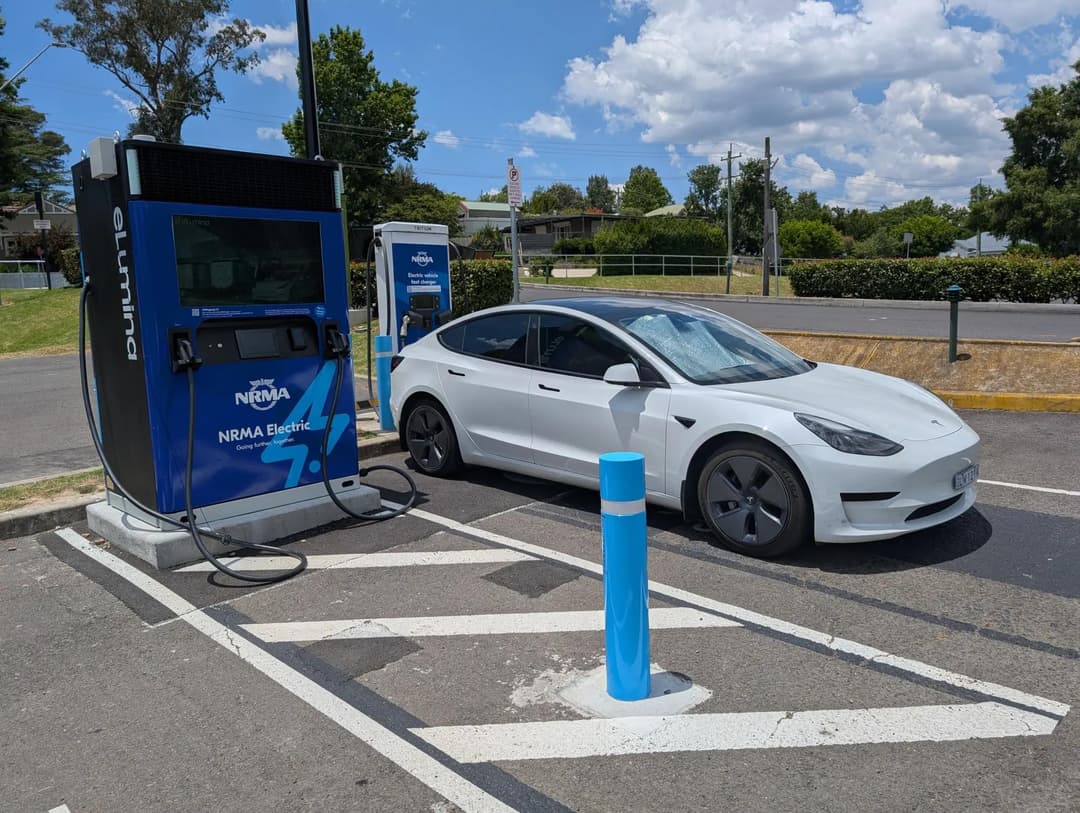
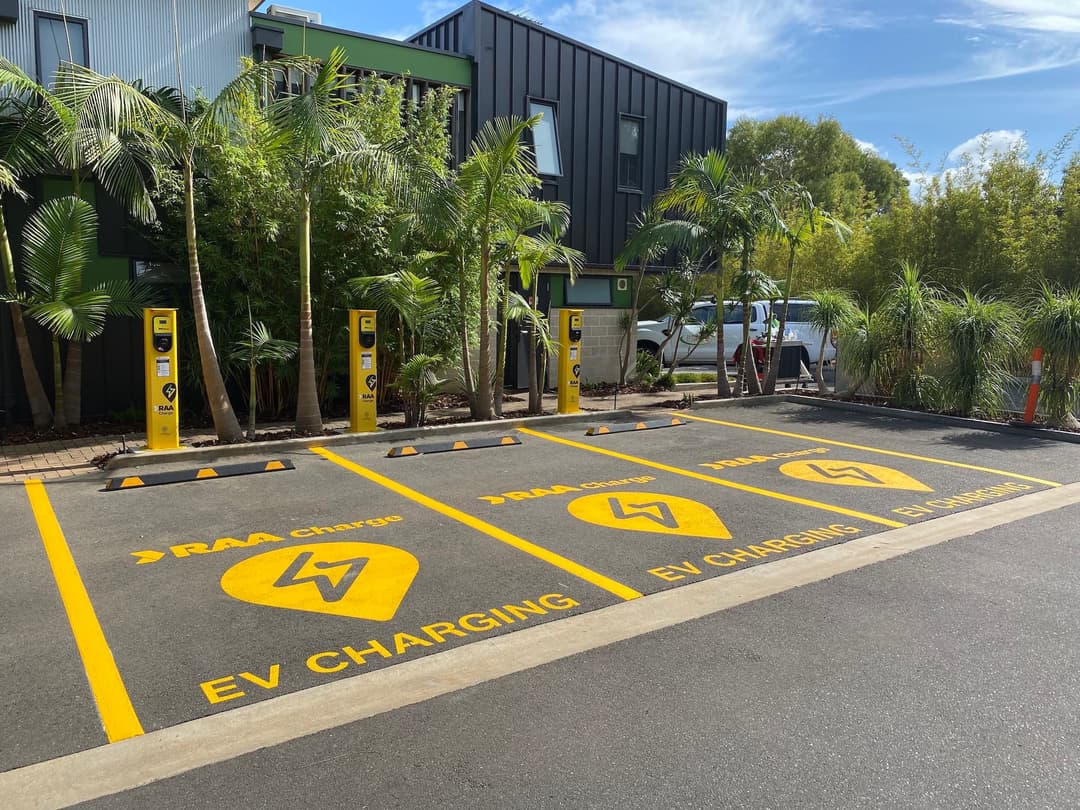
Chargefox is owned by the motoring clubs of Australia, including NRMA, RACV, RAA, RACQ, and the RAC, and provides a 24/7/365 call centre based in Australia for driver support.
| Motoring Club | Coverage Area |
| NRMA | NSW & ACT |
| RACV | VIC |
| RACQ | QLD |
| RAC | WA |
| RAA | SA |
| RACT | TAS |
Some motoring club members may be entitled to discounts and specific locations on Chargefox. You can find out more about these discounts here.
Ultra-rapid chargers are guaranteed to run off 100 per cent renewable energy and the network is mostly made up of AC Schneider Electric EVlink and DC Tritium Brisbane-made charging stations, with some ABB and Kempower units depending on the operator.
Important Note: The 423 sites figure represents the entire Chargefox/Australian Motoring Services network, which includes charging stations branded under NRMA, RACV, RACQ, RAC, RAA, and RACT across Australia. These motoring clubs collectively own and operate the Chargefox network, making it the largest public EV charging infrastructure in the country.
Evie Networks
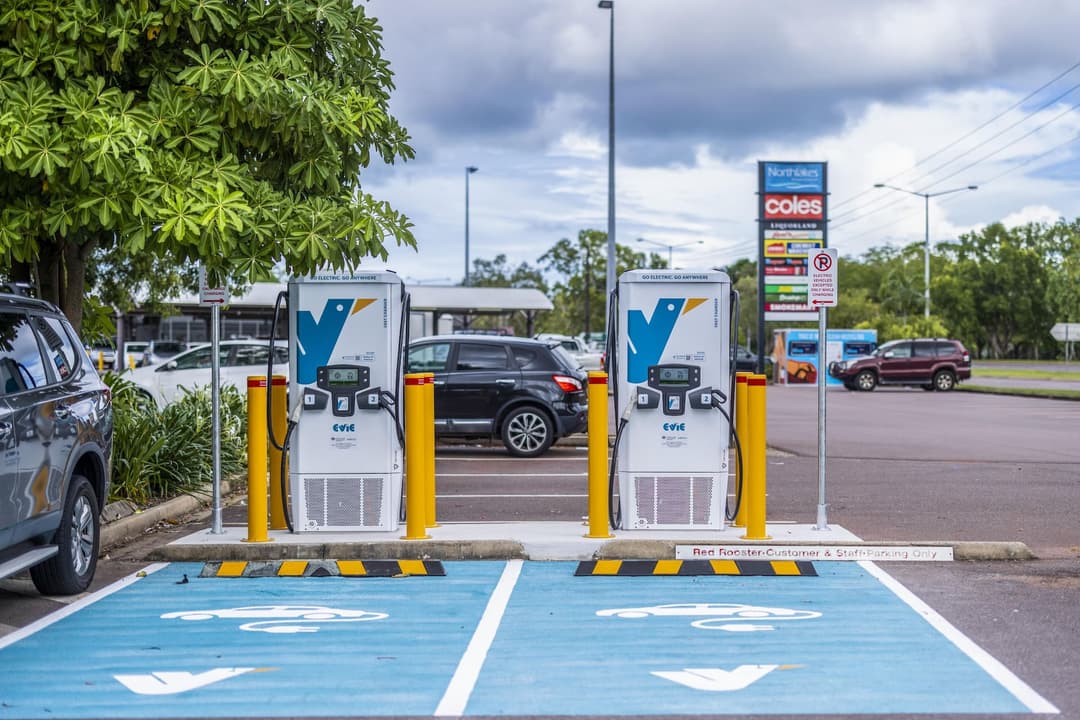
📍 No. of locations: ~325 sites (as of mid-2025)
⏲ Charging speeds: 50kW AC to 350kW DC
💵 Cost: $0.58-$0.75/kWh
📱Start charging: iOS | Android | RFID card compatible
Recognisable for its 'blue bird' logo and bright teal-painted parking spaces, Evie Networks is a fledgelling charging network with a focus on DC fast chargers spread across all states – including being the first DC provider in Darwin.
As standard, it costs $0.58/kWh to juice up on 50kW and 75kW DC fast chargers or $0.73/kWh on 350kW DC ultra-rapid chargers.
There's usually a cluster of one to four stations available at each Evie charging hub, though two stalls are a more common sight.
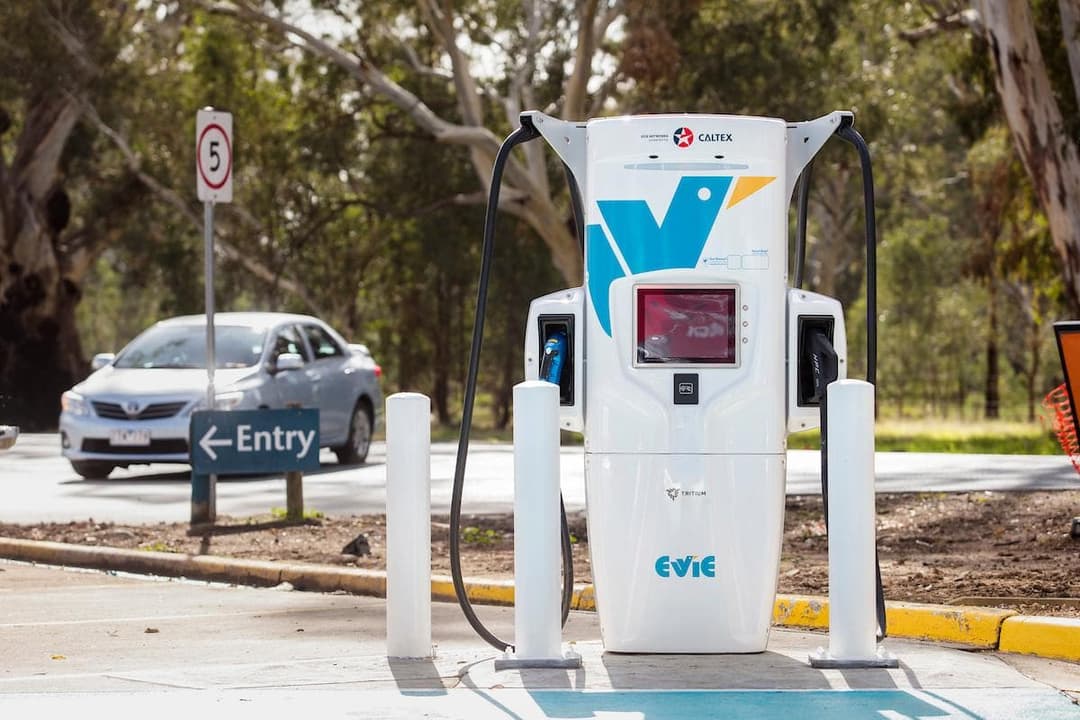
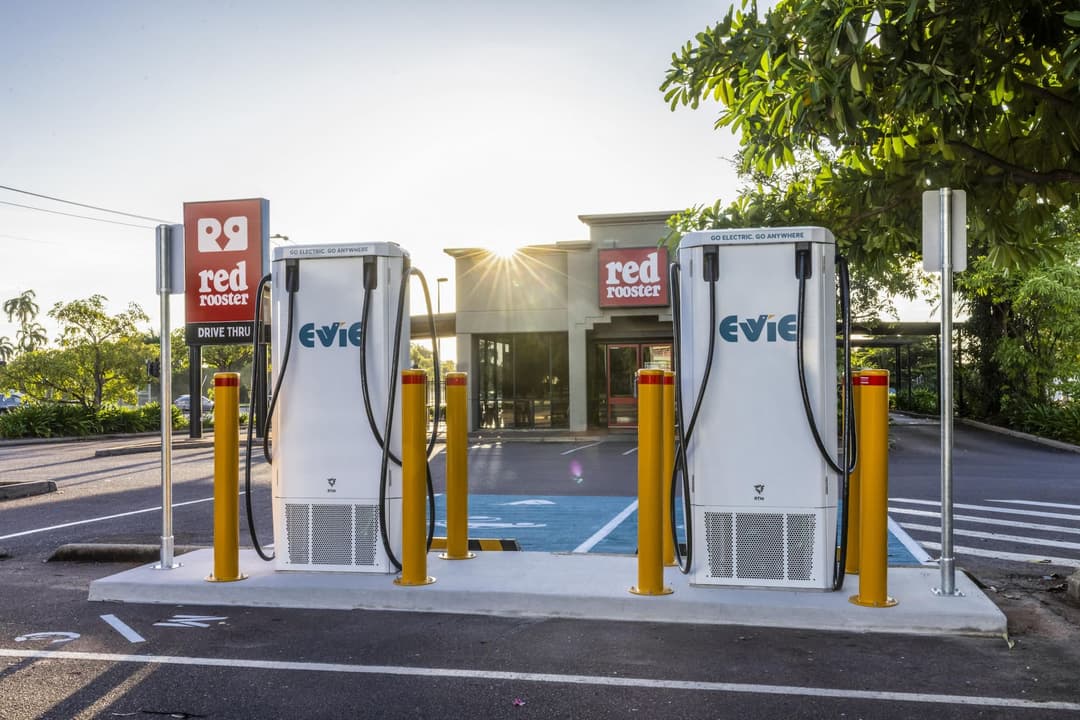
The company primarily uses the Brisbane-born and manufactured Tritium DC charging stalls – all of which run on 100 per cent renewable energy and offer CCS and CHAdeMO charging connectors, the latter for electric cars such as the Nissan Leaf.
Importantly, the Australian company promises that all its electric car charging sites feature 24-hour access, lighting and security.
Evie Networks (under parent Fast Cities Australia) partners with companies including fuel giants like BP, fast food chains like McDonald's, Hungry Jacks and Red Rooster, AMP Capital shopping centres, and local councils to install its chargers near amenities.
Currently, it's the third largest EV charging network in Australia by locations.
In 2025, Evie Networks secured $50 million in funding to accelerate its continued expansion across Australia. The company has also established partnerships with RACQ, offering member discounts to make EV charging more affordable for Queensland motorists.
Exploren Charging Network
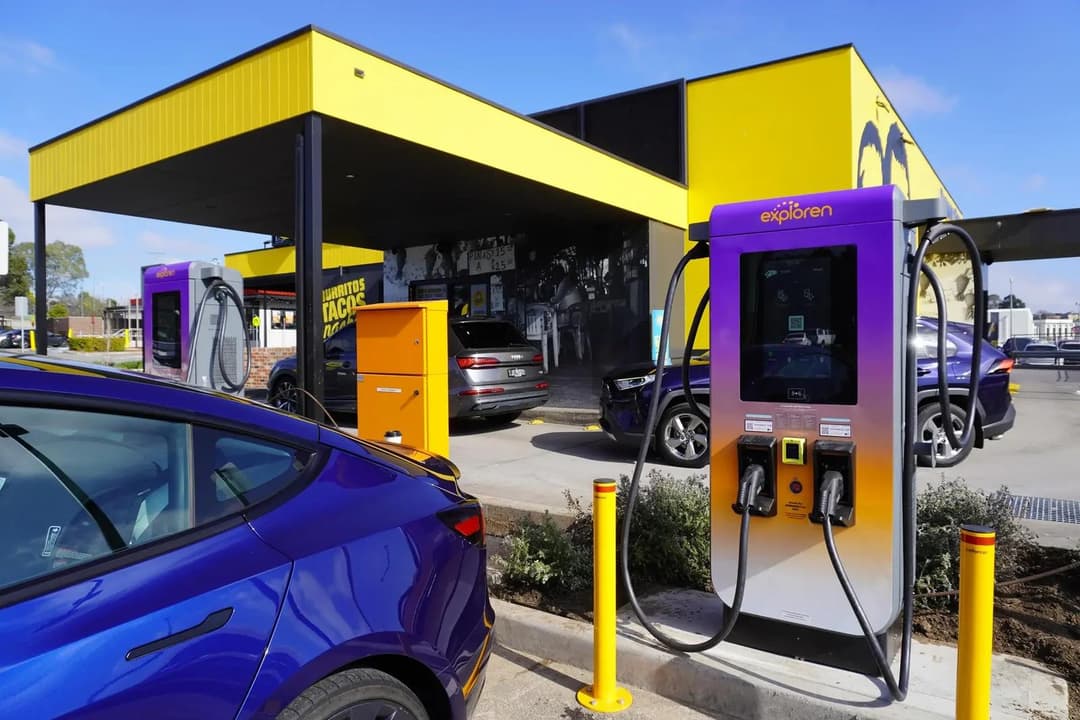
📌 No. of locations: 493 sites (AC and DC) (as of Nov 2025)
⏲ Charging speeds: AC up to 22kW, DC fast chargers up to 200kW+
💵 Cost: Free-$0.55/kWh for AC chargers, $0.55-$0.75/kWh for DC fast chargers
📱Start charging: iOS | Android
Exploren operates one of Australia’s largest electric vehicle charging networks, with more than 493 station locations and 5,500 charging plugs across public, fleet, and apartment sites nationwide.
The Exploren network features both AC destination chargers and DC fast chargers. AC chargers are commonly located at destinations where vehicles are parked for longer periods, such as shopping centres, hotels, and tourist attractions, and typically deliver speeds of up to 22kW. DC fast chargers, found along major routes and in busy urban areas, can reach speeds of 200kW or higher, enabling quicker top-ups for drivers on the move.
Exploren is unique in that it operates as both a charging software platform for charge point operators and a charge point operator (CPO) in its own right.
In April, Exploren expanded significantly through its acquisition of Engie’s DC fast charging network, adding 300 fast charging ports located at high-traffic sites including hospitals, universities, and major shopping centres. The company also powers charging networks at major partners such as Bunnings and Westfield shopping centres.
Drivers can pay for charging sessions using the Exploren app, RFID card, or increasingly via credit card at compatible chargers.
Pricing varies by location, as rates are set by individual site owners. Generally, AC destination chargers cost between $0.40 and $0.60 per kWh, while DC fast chargers range from $0.55 to $0.75 per kWh. This flexibility allows site owners to adjust pricing based on electricity costs and local demand.
Note: Exploren operates as a charging platform connecting drivers to various charging locations. Pricing and availability vary by site owner. Always check the Exploren app for current rates, charging speeds, and availability at your chosen location before starting your charging session.
Tesla Supercharger Network
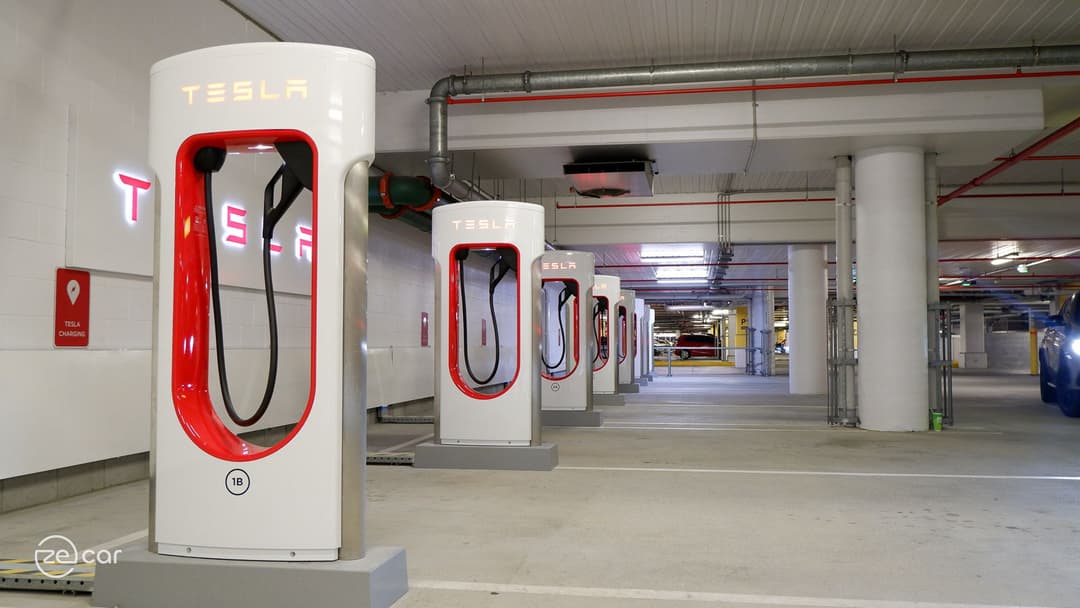
📍 No. of locations: ~131 sites (as of Nov 2025)
⏲ Charging speeds: 120kW or 250kW DC
💵 Cost: $0.69-$0.77/kWh for Tesla owners (variable pricing by location and time); $0.79/kWh for non-Tesla EVs, or $0.64/kWh with $9.99/month subscription
📱Start charging: Plug and charge for Teslas; iOS | Android for non-Tesla EVs
The Tesla Supercharging network is now open to more non-Tesla EV drivers than ever with about two thirds of locations open to non-Tesla drivers.
The network connects along the coast of all Australian states except Northern Territory and is often mooted as a key selling point to buy a Tesla EV.
The key differentiator for Tesla's Supercharger Network is its industry leading reliability and uptime. The company claims a 99.5% uptime rate across its Australian network in 2024, a figure that stands in stark contrast to the more frequent outages reported at other charging networks.
Charging fees vary depending on the time, location, and demand. Non-Tesla EVs need to pay a pricier fixed rate, but a monthly subscription is available to reduce costs.
Some busy hubs limit charging to 80% capacity. Idling fees apply: $0.50 per minute when the site is at 50% capacity, or $1.00 per minute if fully occupied.
Between 3 to 10 stalls are available at each location. The network uses 120kW V2 and 250kW V3 Superchargers with CCS plugs, and continues to roll out new Superchargers across the country.
The Supercharger Network figures do not include Tesla's Destination Charger network which comprises 665 locations. Combined, the Supercharger and Destination Network would make Tesla the second largest charging network in the country.
Note: Tesla uses dynamic pricing that varies significantly by location, time of day, and demand. Non-Tesla drivers should check the Tesla app for current rates at specific locations before charging. These
BP Pulse Network
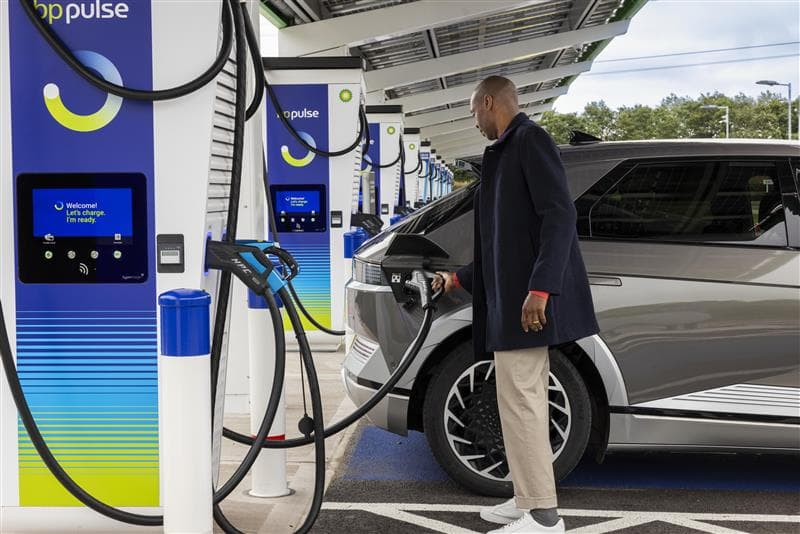
📌 No. of locations: ~70 sites (as of mid-2025)
⏲ Charging speeds: 75kW DC
💵 Cost: $0.66/kWh
📱Start charging: iOS | Android
BP Pulse has expanded into Australia with sites across QLD, NSW, and VIC. Currently offers modular Tritium PKM chargers delivering up to 75kW priced at $0.66/kWh.
Only one stall at each site but chargers can replenish two EVs simultaneously. Some stations have CCS and CHAdeMO, others offer two CCS ports.
Adopts traditional fuel station approach at highway rest stops. Offsets carbon emissions via renewable energy certificates.
Plans to install 350kW ultra-rapid stations and aims for 600 EV chargers.
Note: Pricing is subject to change. Check the BP Pulse app for the most current rates at your chosen location.
AmpCharge Network (Ampol)
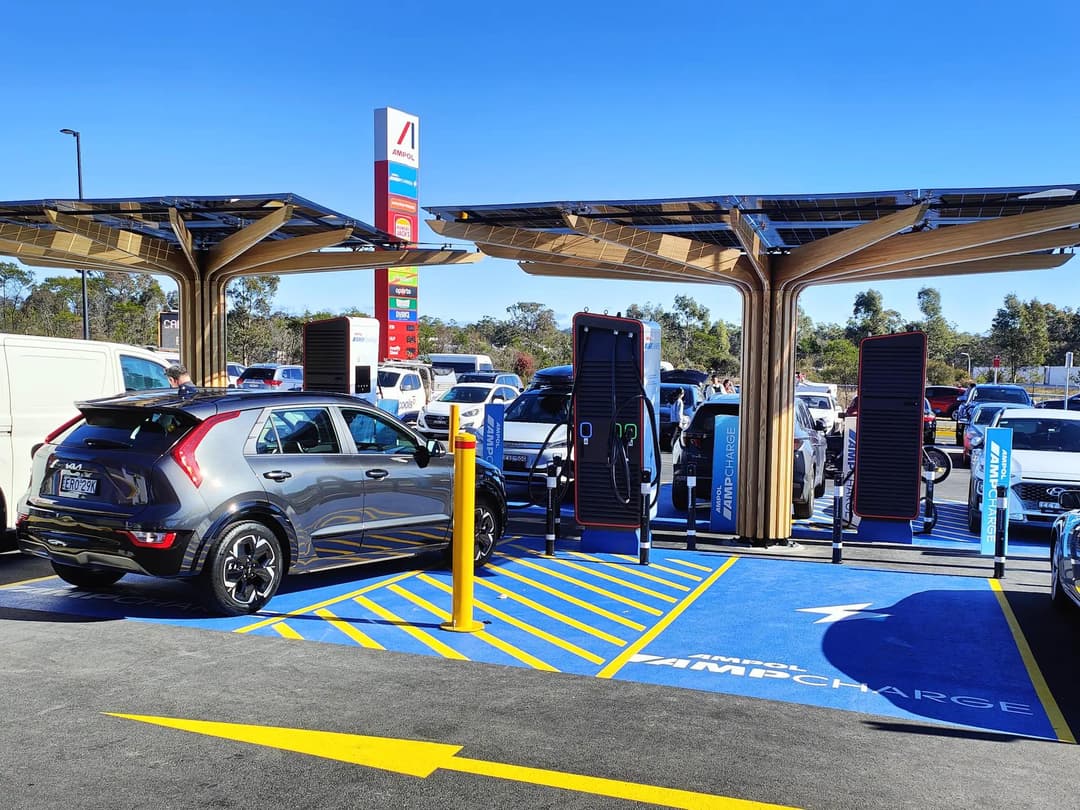
📌 No. of locations: ~72 sites (as of mid-2025)
⏲ Charging speeds: 150kW
💵 Cost: $0.69 per kWh
📱Start charging: iOS | Android
Fuel giant Ampol has entered EV charging with AmpCharge spinoff. Rolled out from 5 pilot locations to 72 sites across QLD, NSW, VIC and WA.
Predominantly offer one 150kW DC fast charging station at each site. ABB stalls can charge two EVs simultaneously using one CCS and one CHAdeMO connector.
Chargers run off renewable energy or covered by green certificates using solar and battery storage. Located in Ampol fuel station forecourts.
With Arena contribution of $7 million to $27 million project, aims to deliver 120 fast charging stations. Plans to offer home and commercial charging products.
Note: As Ampol continues to expand its network, pricing may vary by location. Always verify current rates in the AmpCharge app before charging.
Jolt Charging Network
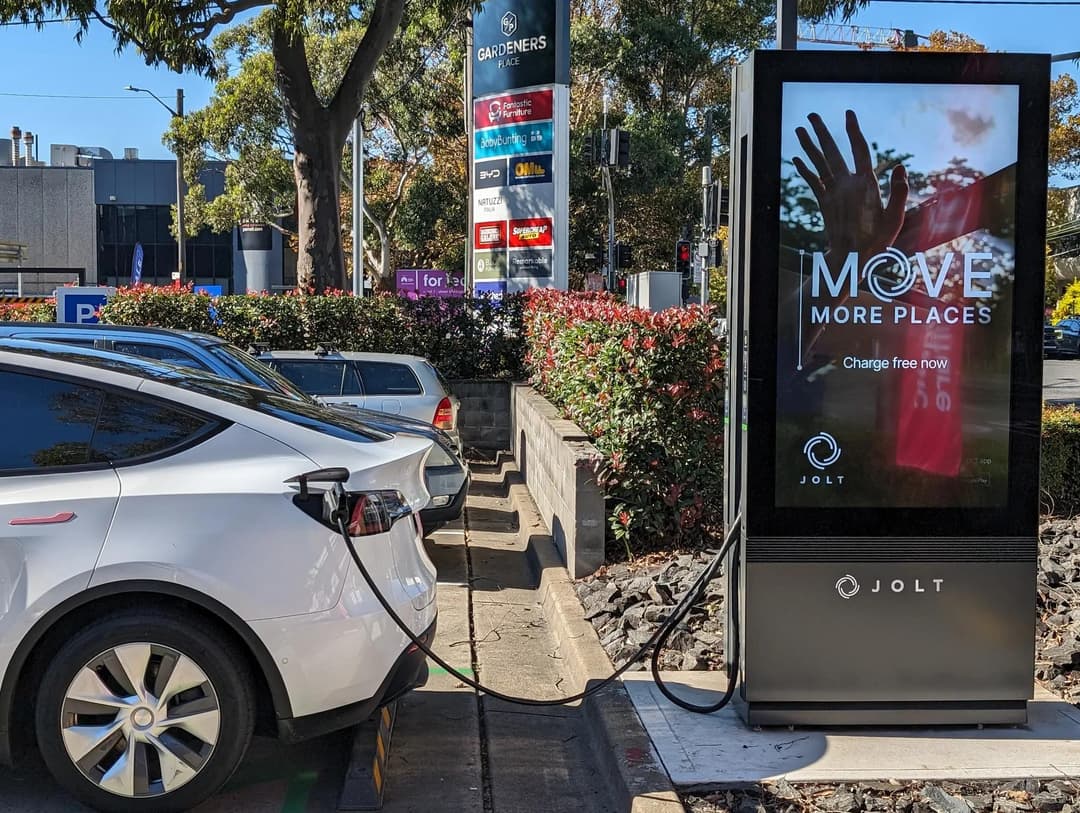
📌 No. of locations: ~98 sites (as of mid-2025)
⏲ Charging speeds: 25kW or 50kW DC
💵 Cost: 7kWh free + $0.54/kWh thereafter
📱Start charging: iOS | Android
Jolt is unique Australian EV charging provider that displays digital billboard advertisements and transforms electricity distribution boxes into streetside chargers. Available in Sydney, Melbourne and Adelaide.
Most chargers top out at 25kW DC speeds. Offers 7kWh of free charging to all users every 24 hours - equivalent to around 45km driving range. Incurs fee after 7kWh plus overstay charge of $5.00 every 30 minutes if EV completed charging but still plugged in.
Typically only one Jolt charger at each location with CCS and CHAdeMO plugs. Uses 100% renewable wind and solar energy certified by GreenPower.
Note: The 7kWh free charging resets every 24 hours. Overstay fees apply strictly to prevent charger hogging. Check the Jolt app to monitor your charging session and avoid additional charges.
Other EV Charging Networks
EVX
EVX Australia is a company focused on expanding public electric vehicle charging access by installing kerbside, pole-mounted AC chargers. Their strategy uses existing utility poles to enable a faster and less disruptive rollout, which is particularly useful in areas with limited off-street parking. As of mid-2025, EVX reports over 100 live chargers in NSW and plans to install an additional ~120 chargers across Victoria, NSW, SA and the ACT within the next 10-12 months.
Key Features:
- Renewable Energy: Chargers are 100% powered by renewable energy.
- Dual Sockets: Each unit has dual 22 kW Type 2 sockets for compatibility with most passenger EVs.
▶️MORE: RACV And EVX Join Forces To Boost Kerbside EV Charging
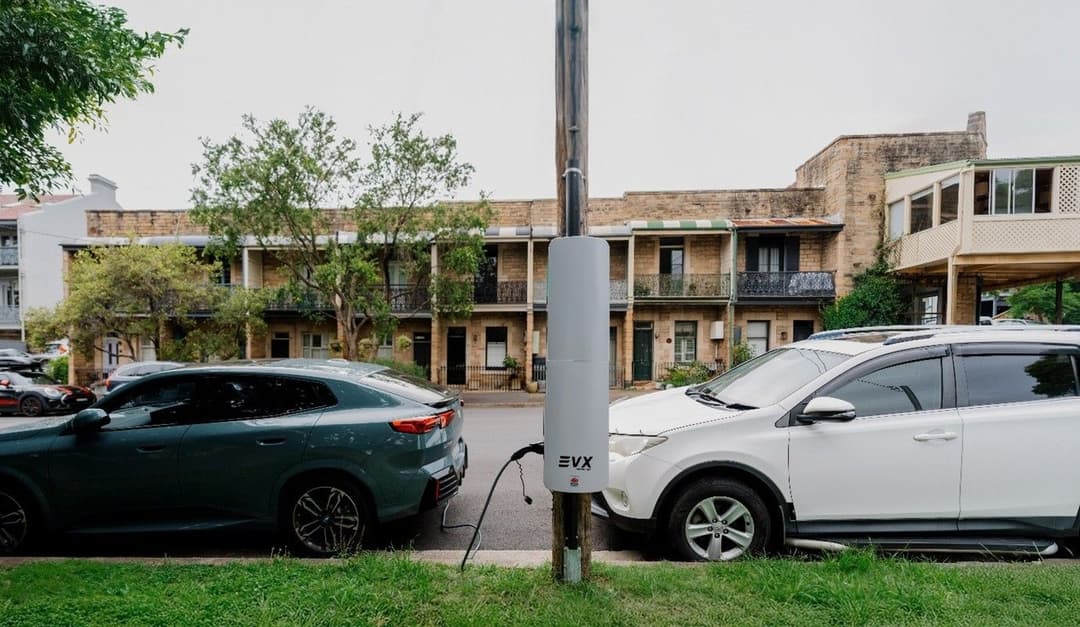
Tesla Destination Chargers
In addition to its DC Supercharging network, Tesla operates one of Australia's largest slow AC charging networks, installed by local businesses across all states. The 11kW AC Tesla Wall Connector uses the common Type 2 connector and can charge any EV model, though many sites have signage permitting Tesla EVs only. There are currently 665 Tesla Destination Charger sites.
▶️MORE: Tesla Model 3 & Y Home Charging Guide
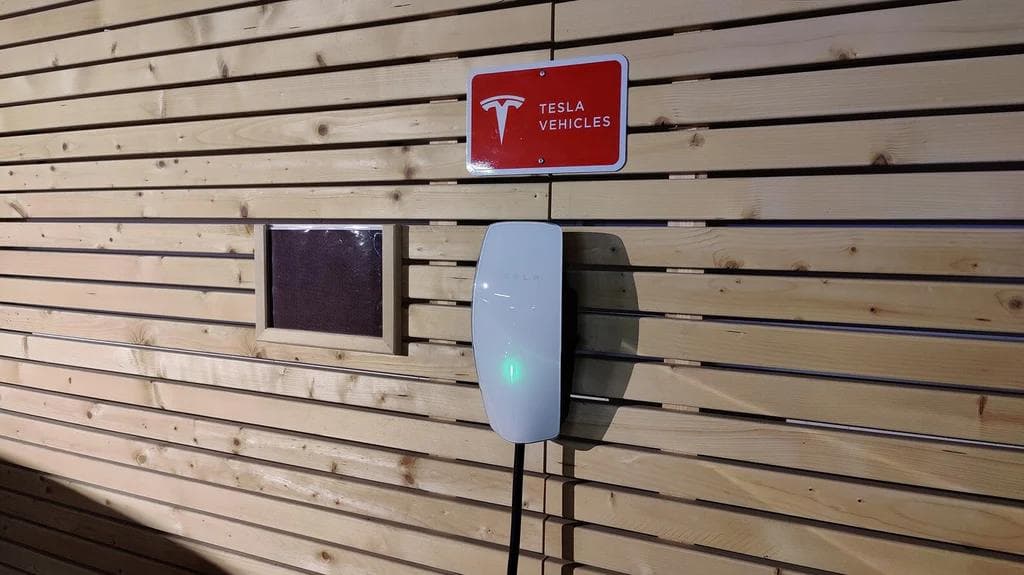
AGL
AGL operates one of Australia's largest kerbside public EV charging networks, with more than 150 on-street chargers currently active across Sydney suburbs such as Balmain, Lewisham, Newtown, and Stanmore. The company is expanding through a partnership with PLUS ES to install an additional 149 pole-mounted chargers across New South Wales, marking one of the most extensive urban deployments in the country. These chargers are primarily AC units designed for residential streets and high-density areas, making EV ownership more convenient for drivers without home charging access.

Porsche Centre and Destination Charging
Porsche offers more than 50 charging locations across all states except the Northern Territory. Select Porsche dealerships feature 175kW and 350kW DC ABB ultra-rapid stations exclusive to Porsche EV customers. Other premium destinations offer 11kW AC Porsche-branded wall boxes open to all EV models.
Everty
Sydney-based Everty operates more than 50 slow AC charging locations and offers a unique booking system allowing users to reserve charging sessions at residential, business, or public sites. This flexibility makes Everty particularly useful for planned charging stops.
EVUp
EVUp offers around 55 charging sites across all states in urban and rural regions, with both AC and DC stations tied to businesses and council areas. The network focuses on providing charging infrastructure in underserved regional locations.
ChargeStar
ChargeStar provides AC and DC charging stations scattered around the country, with particular focus on South Australia and Western Australia. Notable installations include the RAC Electric Highway, Flinders University, and Mirvac apartment developments.
Biofil
A unique solution for remote Australia, Biofil operates 50kW Tritium chargers powered by vegetable oil. Sites include the Caiguna Roadhouse (enabling EVs to cross the 1,100km Nullarbor Plain) and Jurien Bay in Western Australia, providing critical infrastructure where grid connection is challenging.
Network Comparison Table (2025)
Here's a quick comparison of Australia's major EV charging networks to help you choose the right provider for your needs. All figures are current as of mid-2025 and subject to change as networks continue to expand.
| Network | Sites | Charging Speed | Pricing |
| Chargefox | 950 | 4kW-350kW AC/DC | Free-$0.70/kWh |
| Evie Networks | 325 | 22kW-350kW AC/DC | $0.58-$0.75/kWh |
| Tesla Supercharger | 131 | 120kW-250kW DC | $0.69-$0.77/kWh (Tesla); $0.79/kWh (non-Tesla) |
| Exploren | 493 | AC up to 22kW, DC up to 120kW+ | $0.55-$0.75/kWh |
| Jolt | 98 | 25kW-50kW DC | 7kWh free, then $0.54/kWh |
| Ampol AmpCharge | 72 | 150kW DC | $0.69/kWh |
| BP Pulse | 70 | 75kW DC | $0.66/kWh |
Sources: carloop
Australian Charging Networks FAQs
About the author
Stay up to date with the latest EV news
- Get the latest news and update
- New EV model releases
- Get money savings-deal

